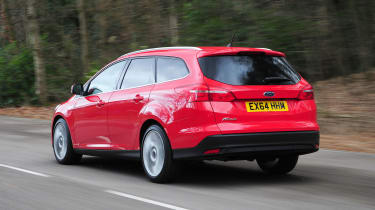Ford Focus Estate (2014-2018) - MPG, running costs & CO2
The Ford Focus Estate offers a range of TDCi diesel and EcoBoost petrol engines that return excellent fuel economy
The Ford Focus Estate range starts from less than £21,000, but that only gets you the most basic 1.5-litre diesel Style ECOnetic or 1.0-litre petrol Zetec Edition model. You’re looking at a minimum of just over £22,000 for the desirable and well equipped ST-Line version with a more powerful TDCi diesel or EcoBoost petrol engine.
That’s broadly comparable to mainstream rivals such as the Kia Cee’d SW, Vauxhall Astra Sport Tourer and Peugeot 308 SW, but less than the classier, more upmarket Volkswagen Golf Estate.
Ford Focus Estate MPG & CO2
If you want the best possible fuel economy from your Focus estate, choose the latest 1.5-litre TDCi diesel engine, which can achieve up to 83.1mpg in the 104bhp version and 74.3mpg in more powerful 118bhp form. We’d recommend the more powerful version, which offers a better all-round driving experience and more relaxed cruising.
The two 1.5-litre diesels are also the only versions of the Ford Focus estate with sub-100g/km CO2 emissions qualifying them for Benefit-in-Kind (BiK) rates from 20 to 21%, saving company-car drivers money.
Even the top-of-the-range diesel, a fast 2.0-litre TDCi with 148bhp, emits just 105g/km of CO2 for 23% BiK and can achieve a very respectable 70.6mpg, but it’s only available in the expensive ST-Line, Titanium and Titanium X models, which can depreciate steeply.
More reviews
In comparison, the most economical Vauxhall Astra Sports Tourer diesel will return around 83mpg, while the BlueMotion version of the Volkswagen Golf Estate can manage 81mpg. The Peugeot 308 SW is the real fuel-economy champion in this class, however, with the BlueHDi diesel returning 88mpg.
Ford EcoBoost turbocharging technology helps improve the fuel economy and emissions figures of the petrol Focus estate, but they’re still some way off the diesel. The 98 and 123bhp versions of the 1.0-litre EcoBoost engine can both return 58.9mpg and sit in the 20% and 21% BiK bands, while the more powerful 1.5-litre version sees economy drop to 50.4mpg and BiK liability increase to 24% courtesy of 128g/km CO2 emissions.
After the first year's CO2-based road tax (generally included in the on-the-road price), every version of Ford Focus will cost £140 a year to tax.
Insurance
Insurance ratings for the Focus estate range from group 11 for the most basic petrol-engined model to group 22 for the range-topping Titanium X diesel version. The more expensive Volkswagen Golf Estate should actually be similar to insure, as it runs from group 11 to 20.
Warranty
Like all new Ford cars, the Focus Estate comes with a 60,000-mile/three-year warranty. This is pretty unexceptional, and is outdone by both the Hyundai i30 Tourer’s unlimited-mileage/five-year cover and the Kia Cee’d SW’s 100,000-mile/seven-year offer. The Focus warranty can be extended for up to another two years at extra cost, however.
Servicing
The service interval for all versions of the Focus Estate is 12,500 miles or one year, whichever comes first. Ford offers something called the Ford Protect Premium Plan that lets you pay for your Focus servicing up front. For £340 (two years) or £570 (three years), all scheduled maintenance as well as breakdown cover is taken care of.
Replacement brake fluid, bodywork and paint checks and an air-conditioning check (where applicable) are also included. Alternatively, you can set up a monthly payment plan with your local dealer if you want to spread the cost of servicing. The price of this is calculated on a case-by-case basis.
Which Is Best?
Cheapest
- Name1.0 EcoBoost Hybrid mHEV Titanium 5dr
- Gearbox typeManual
- RRP£29,660
Most Economical
- Name1.0 EcoBoost Hybrid mHEV Titanium 5dr
- Gearbox typeManual
- RRP£29,660
Fastest
- Name2.3 EcoBoost ST 5dr Auto
- Gearbox typeAuto
- RRP£40,455














